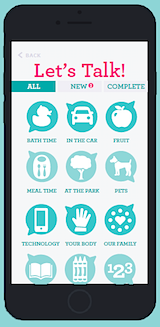 Humans are born with the capacity and inclination to think. Nobody has to “teach us how to think” just as no one teaches us how to move or walk. ~ Art Costa
Humans are born with the capacity and inclination to think. Nobody has to “teach us how to think” just as no one teaches us how to move or walk. ~ Art Costa
This insight from Art Costa in his 2008 Educational Leadership article titled “The Thought-filled Curriculum,” dramatically impacted the thinking of Stephanie Harvey, co-author with Anne Goudvis of Strategies That Work and the Comprehension Toolkit.
In fact, Costa’s insight ought to influence all of us, because if children are born thinking, we should be deepening their ability to think effectively, comprehensively, and nimbly early on. In other words, we need to work on a child’s comprehension from birth.
 Georgia, our state neighbor to the east, has acted on this knowledge and created a wonderful initiative called Talk With Me Baby. This link will take you to a plethora of resources, including a short, compelling video about the importance of talking to babies from birth. There’s even a free app for parents with weekly lessons, talking tips, and a tracking tool for developmental milestones.
Georgia, our state neighbor to the east, has acted on this knowledge and created a wonderful initiative called Talk With Me Baby. This link will take you to a plethora of resources, including a short, compelling video about the importance of talking to babies from birth. There’s even a free app for parents with weekly lessons, talking tips, and a tracking tool for developmental milestones.
Intentional and constant talking to infants and toddlers can overcome one of the biggest learning barriers facing students living in poverty: a growing word gap. According to research found on the Talk With Me Baby website, children from low-income families hear approximately 600 words every hour, whereas children from higher-income families hear approximately 2,000 words an hour.
This 30 million-word gap leads to dramatic differences in vocabularies of 18 month-old children, which increase significantly between 18 months and 24 months.
And, as the Talk With Me Baby website reminds us, talking is free!
But, future students need more than just talk. They need to be exposed to books, readily available from public libraries and often augmented by bookmobiles, programs like the Dolly Parton Imagination Library, and other sources. There is a great online resource for free children’s e-books at StoryJumper that even has an option to print out the book, if you’d prefer a hard copy!
We can all do our part to spread the words
As Art Costa (co-creator with Bena Kallick of the Habits of Mind program) points out in his EL article:
“…skillful thinking is hard work. And as with athletics, students need practice, reflection, and coaching to think well. With proper instruction, human thought processes can become more broadly applied, more spontaneously generated, more precisely focused, more complex, and more insightfully divergent.”
And, we can’t just rely on or wait for formal education. Educators can help spread the word that babies need to develop their ability to think and comprehend from the very start. It’s certainly in the self-interest of schools!
Babies are waiting for us to help them expand and enrich their thinking. As they grow, their comprehension skills need to grow with them.
I’m planning to write periodic blogs on what I’m learning about building children’s comprehension and thinking skills. In the meantime, I hope you’ll share these resources with your colleagues, friends and particularly parents of very young children. Our babies’ brains are hungry. Let’s talk to them!


What a great post! The Atlanta Speech School also has FREE, research-based online trainings that teachers and caregivers can take to help children from infancy through third grade build “language nutrition” – https://www.readrightfromthestart.org